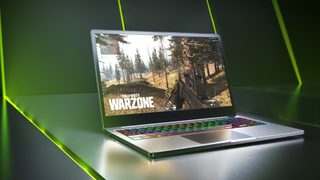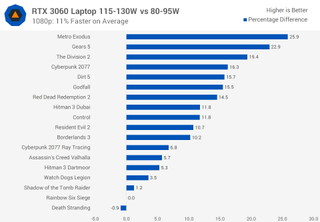Multiple RTX 3060 Mobile TDP Configurations Tested
The results are... complicated

Performance for Nvidia's RTX 3060 mobile has been difficult to understand, with the 3060 (as well as RTX 3070 and RTX 3080 mobile) being capable of running in a range of power configurations depending on the laptop model. Now we have some actual data on how much faster or slower the different TDP configurations are. (Note: We're using "TDP," aka Thermal Design Power, and "TGP," aka Total Graphics Power, interchangeably. Basically, we're talking about the total amount of power the graphics card subsystem is design to dissipate.)
Hardware reviewer Techspot (known as Hardware Unboxed on YouTube), recently checked out a pair of RTX 3060 equipped laptops and ran them in an assortment of gaming benchmarks. The notebook used was the XMG Apex 17 with two different configurations, one with a Ryzen 7 5800H CPU and a 115W configured RTX 3060, the other equpped with an Intel Core i7-10870H and an 80W configured RTX 3060. (Side note: the 5800H probably has more thermal headroom than the 10870H.)
Keep in mind, both notebooks feature Max-Q Dynamic Boost, which can give the RTX 3060 mobile up to an additional 15W of power when CPU utilization is low enough, so the TDP listed for each RTX 3060 mobile is simply the baseline spec.

Comparing all the gaming results together, TechSpot found that the performance gap between the higher and lower-powered RTX 3060s was on average 11%, with a few outliers in the 20% range and others in the <5% range.
Of course, the processor choice affects these results somewhat. TechSpot does say that most of the games tested were primarily GPU bottlenecked, but there are certainly games that still favor Intel's architecture.
As expected, the performance differences — at least for the 80W vs 115W model — will vary based on the games you play. That's especially true with Dynamic Boost 2.0 working in the background, which is also affecting these results.
Unfortunately, TechSpot wasn't able to test the 60W RTX 3060, and frankly, that model is probably the most interesting to test. At 60W, you are almost cutting the 3060's power consumption in half when compared with the 115W model. It will be interesting to see how well that configuration does within the power contraints.
Stay on the Cutting Edge
Join the experts who read Tom's Hardware for the inside track on enthusiast PC tech news — and have for over 25 years. We'll send breaking news and in-depth reviews of CPUs, GPUs, AI, maker hardware and more straight to your inbox.
We're working to get RTX 30-series laptops in for review as well, and we've already looked at the Asus Flow X13, Alienware m15 R4 and Alienware m17 R4. Unfortunately, none of those are equally equipped when it comes to hardware. Not surprisingly, the specific laptop design will impact the performance quite a bit.

Aaron Klotz is a freelance writer for Tom’s Hardware US, covering news topics related to computer hardware such as CPUs, and graphics cards.
Most Popular

